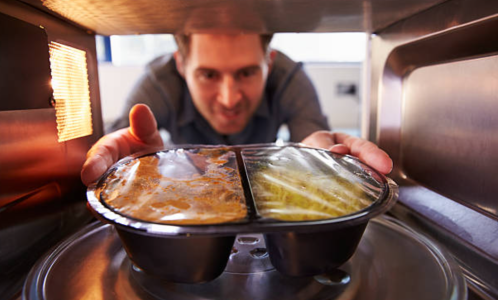Stop Microwaving These 4 Foods Immediately, Warns Dietician - Your Health Could Be at Risk!
By
Gian T
- Replies 2
As we age, convenience often becomes more of a priority in our daily routines. Microwaves have been a staple in kitchens for decades, offering a quick and easy way to heat up meals. However, not all foods are created equal when it comes to microwave reheating. In fact, some can pose a risk to your health or lose their nutritional value and palatability when zapped in the microwave.
Amanda Holtzer, a dietician from New Jersey, has highlighted four common foods that should be kept far away from the microwave. These revelations may make you think twice before reheating certain leftovers.
Firstly, let's talk about hard-boiled eggs. They may seem like a simple snack or salad addition, but microwaving them can lead to a messy and potentially dangerous outcome. The steam and pressure that build up inside the egg white can cause an explosion when the egg is cut into or bitten. This eruption can occur inside the microwave, on your plate, or even in your mouth, leading to possible burns. It's a startling fact that many of us may not have considered, but it's a good reminder to opt for alternative warming methods for your hard-boiled eggs.
Next on the list are foods rich in vitamin C, such as broccoli, brussels sprouts, and potatoes. Vitamin C is a sensitive nutrient that degrades when exposed to heat. To preserve the full benefits of these vitamin C-rich foods, it's best to consume them raw or lightly cooked. Microwaving them not only diminishes their nutritional value but can also alter their taste and texture, making them less enjoyable to eat.
Chicken is another food that doesn't fare well in the microwave. After being refrigerated, the fats in cooked chicken can oxidise, changing the chemical structure and, consequently, the taste of the meat. Reheating it in the microwave can exacerbate this issue, causing the chicken to lose moisture and become dry and unappetising. If you've ever experienced chicken that tastes a bit 'off' after microwaving, this could be the reason why.
Fish is the fourth food to avoid microwaving. Similar to chicken, the high temperatures of the microwave can cause the moisture in fish to evaporate, leaving you with a dry, rubbery meal. Not only does this affect the texture, but it can also impact the flavour, making it far less appealing than when it was freshly cooked.
Beyond these specific foods, there's also a broader health concern with microwaving food in plastic containers. Dr Shanna Swan, an epidemiologist and expert on endocrine disruptors, warns against this practice. Chemicals like BPA and phthalates, which are added to plastics to increase durability, can leach into your food when heated. These endocrine disruptors can interfere with the body's hormones and have been linked to fertility issues. While regulators maintain that the average person's exposure is within safe limits, it's wise to err on the side of caution and avoid microwaving food in plastic whenever possible.
So, dear members of the Seniors Discount Club, next time you're about to reheat your meal, consider these tips from the experts. Opt for the oven, stovetop, or even a toaster oven for a safer and tastier result. And remember, when it comes to storing and reheating your food, glass containers are a much safer bet than plastic.

Have you ever had a food mishap with the microwave? Or do you have any tips for reheating food safely and deliciously? Share your experiences and advice in the comments below – your fellow club members would love to hear from you!
Amanda Holtzer, a dietician from New Jersey, has highlighted four common foods that should be kept far away from the microwave. These revelations may make you think twice before reheating certain leftovers.
Firstly, let's talk about hard-boiled eggs. They may seem like a simple snack or salad addition, but microwaving them can lead to a messy and potentially dangerous outcome. The steam and pressure that build up inside the egg white can cause an explosion when the egg is cut into or bitten. This eruption can occur inside the microwave, on your plate, or even in your mouth, leading to possible burns. It's a startling fact that many of us may not have considered, but it's a good reminder to opt for alternative warming methods for your hard-boiled eggs.
Next on the list are foods rich in vitamin C, such as broccoli, brussels sprouts, and potatoes. Vitamin C is a sensitive nutrient that degrades when exposed to heat. To preserve the full benefits of these vitamin C-rich foods, it's best to consume them raw or lightly cooked. Microwaving them not only diminishes their nutritional value but can also alter their taste and texture, making them less enjoyable to eat.
Chicken is another food that doesn't fare well in the microwave. After being refrigerated, the fats in cooked chicken can oxidise, changing the chemical structure and, consequently, the taste of the meat. Reheating it in the microwave can exacerbate this issue, causing the chicken to lose moisture and become dry and unappetising. If you've ever experienced chicken that tastes a bit 'off' after microwaving, this could be the reason why.
Fish is the fourth food to avoid microwaving. Similar to chicken, the high temperatures of the microwave can cause the moisture in fish to evaporate, leaving you with a dry, rubbery meal. Not only does this affect the texture, but it can also impact the flavour, making it far less appealing than when it was freshly cooked.
Beyond these specific foods, there's also a broader health concern with microwaving food in plastic containers. Dr Shanna Swan, an epidemiologist and expert on endocrine disruptors, warns against this practice. Chemicals like BPA and phthalates, which are added to plastics to increase durability, can leach into your food when heated. These endocrine disruptors can interfere with the body's hormones and have been linked to fertility issues. While regulators maintain that the average person's exposure is within safe limits, it's wise to err on the side of caution and avoid microwaving food in plastic whenever possible.
So, dear members of the Seniors Discount Club, next time you're about to reheat your meal, consider these tips from the experts. Opt for the oven, stovetop, or even a toaster oven for a safer and tastier result. And remember, when it comes to storing and reheating your food, glass containers are a much safer bet than plastic.
Key Takeaways
- A dietician, Amanda Holtzer, warns against reheating certain foods in the microwave due to health risks or damage to the food's taste and texture.
- Foods to avoid microwaving include hard-boiled eggs, which can explode, and foods high in vitamin C, like broccoli and potatoes, which can lose their nutrient value.
- Reheating chicken can lead to an off taste and texture due to oxidation of fats, and fish can become dry and rubbery due to moisture evaporation.
- The article also discusses the health risks related to microwaving food in plastic containers, including the leaching of endocrine-disrupting chemicals such as BPA and phthalates into food.








